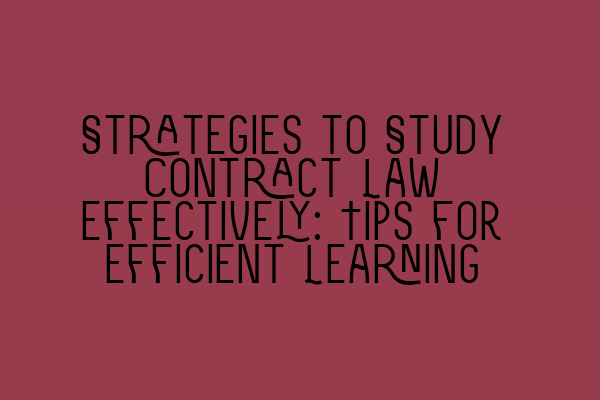Strategies to Study Contract Law Effectively: Tips for Efficient Learning
Contract law is a fundamental aspect of legal practice and a key subject to master for aspiring solicitors. Understanding the principles and intricacies of contract law is vital for success in both the academic and professional spheres. However, studying contract law can sometimes be challenging due to its complex nature. To help you navigate the world of contract law effectively, we have compiled a list of strategies and tips for efficient learning.
1. Start with the Basics
Before diving into the more complex aspects of contract law, it is crucial to have a strong foundation. Begin by familiarizing yourself with the basic principles, concepts, and terminology of contract law. Understanding the elements of a contract, the different types of contracts, and the requirements for enforceability will provide you with a solid framework upon which you can build your knowledge.
For in-depth information on navigating legal challenges and pitfalls in your legal practice, check out our article: Navigating Legal Challenges and Pitfalls in Your Practice.
2. Utilize Case Studies
Contract law is best understood through real-life application. Incorporate case studies into your study routine to gain insight into how contract law principles are applied in actual legal cases. Analyzing and discussing landmark contract law cases will help you understand the reasoning behind legal principles and how they are interpreted by the courts.
3. Prioritize Key Concepts and Themes
Contract law is vast, and attempting to memorize every single detail can be overwhelming. Instead, focus on understanding the key concepts and themes that underpin contract law. Identify the fundamental principles and recurring themes that emerge in contract law cases. By prioritizing these core ideas, you will be better equipped to apply them in different scenarios.
For a comprehensive comparison between barristers and solicitors, read our article: Barrister vs. Solicitor: A Comprehensive Comparison.
4. Engage in Active Learning
Passive reading is often ineffective when it comes to learning contract law. Actively engage with the material by taking notes, highlighting key points, and summarizing concepts in your own words. Additionally, consider discussing contract law topics with classmates or participating in study groups to foster collaborative learning and gain different perspectives.
5. Test Yourself Regularly
Regular self-assessment is essential for reinforcing your understanding of contract law. Test yourself by answering practice questions, working through hypothetical scenarios, or even creating your own mini-quizzes. By applying your knowledge in a testing environment, you will identify areas that require further review and improvement.
To better understand the SRA Competence Statement and its impact on solicitors, refer to our comprehensive guide: Understanding the SRA Competence Statement: A Guide for Solicitors.
6. Seek Clarification and Guidance
Don’t hesitate to seek clarification or guidance from your professors, tutors, or legal professionals. If you encounter concepts or topics that are unclear, reach out for additional explanations. Contract law can be complex, and it’s better to address any doubts early on to avoid misunderstandings.
7. Explore Specializations
Contract law intersects with numerous legal specializations. Take the time to explore different areas within contract law, such as commercial contracts, employment contracts, or construction contracts. Understanding the specific nuances of different contract types will enhance your overall understanding of contract law and open doors to various career opportunities.
Our article on exploring different solicitor specializations will assist you in finding your niche: Exploring Different Solicitor Specializations: Finding Your Niche.
8. Stay Organized
Effective organization is crucial when studying contract law. Create a study schedule or timetable, setting aside dedicated time for contract law revision. Break down the material into manageable sections, making it easier to review and retain information. Utilize tools such as flashcards, mind maps, or online note-taking apps to keep your study materials organized and easily accessible.
To discover the top law schools in the UK, check out our recommendations: Top Recommendations for Law Schools in the UK.
Conclusion
Studying contract law effectively requires a strategic approach that incorporates a solid foundation, active learning, regular self-assessment, and seeking guidance when needed. By following these strategies and tips, you will build a strong understanding of contract law principles and enhance your ability to apply them in both academic and professional settings.
